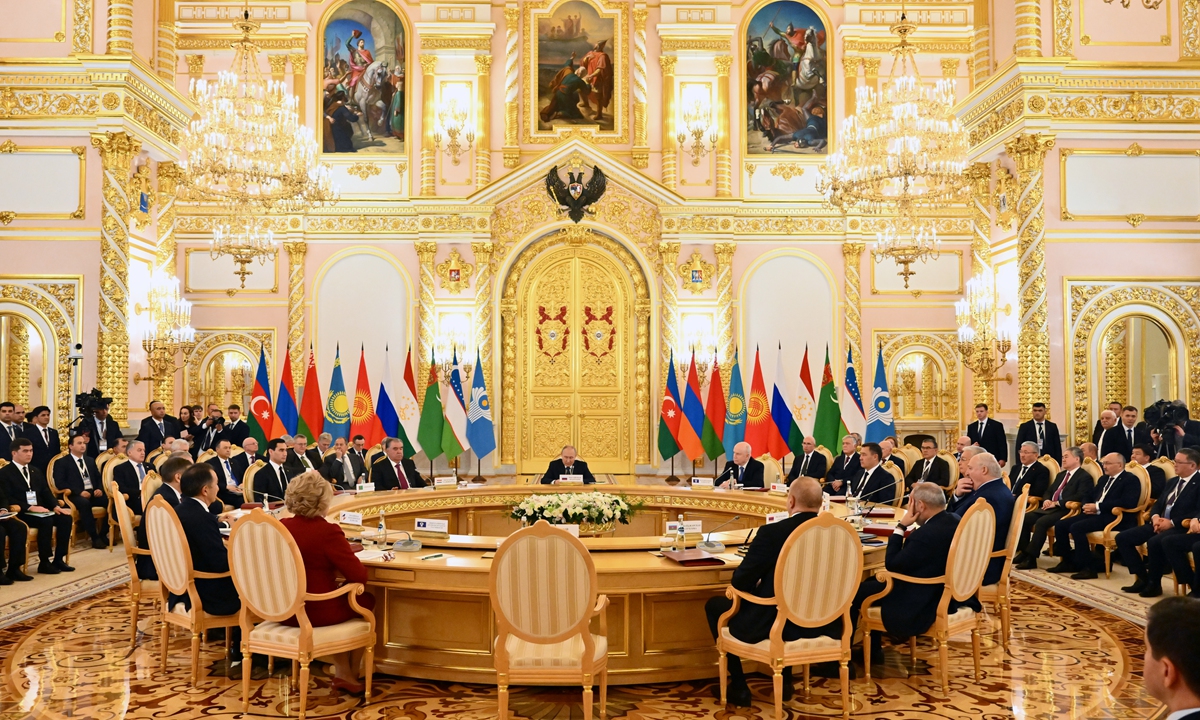
Russian President Vladimir Putin with other officials attends an expanded format meeting of the Commonwealth of Independent States (CIS) Heads of State Council at the Kremlin in Moscow, Russia, on October 8, 2024. Photo: VCG
In 2024, the US and the EU took advantage of Russia being caught up in the Ukraine crisis and continued to expand their influence in Eurasia, trying their best to weaken Russia's status and role. Russia strengthens relations with allies and friendly countries through multilateral and bilateral means to safeguard its strategic interests. In general, both parties have made some gains and the game will continue in the future.
In the South Caucasus, relations between Russia and Azerbaijan have heated up significantly in 2024. After Armenia lost the contest with Azerbaijan over the sovereignty of the Nagorno Karabakh region in 2020, it attributed the main reason to Russia's failure to provide the necessary support and thus began to "get closer" to the US and Europe. Nonetheless, out of economic interests, Armenia remains in the Eurasian Economic Union and the Commonwealth of Independent States, because, at this stage, Armenia's economic security, people's lives and social development do not allow complete separation from Russia.
The situation in Georgia, another country in the South Caucasus, has also changed in favor of Russia this year. In the country's October 26 election, the ruling Georgian Dream Party, which is considered pro-Russia, won with 54 percent of the vote. In recent years, Russia has been Georgia's second-largest trading partner. However, Georgia's action has caused dissatisfaction in the US and Europe. In July, the US announced an indefinite postponement of its annual military drills with Georgia and froze $95 million in aid to it. In late October, the EU suspended Georgia's EU membership process.
In Central Asia, Washington still pursues its "US Strategy for Central Asia 2019-2025: Advancing Sovereignty and Economic Prosperity." The EU has also updated its strategy on Central Asia based on the geopolitical events that have occurred in recent years, focusing mainly on wooing Central Asian countries politically and weakening their ties with Russia economically.
In the economic and trade cooperation between the US, Europe and Central Asian countries, two aspects are prominent: First, critical minerals. For example, the UK and Kazakhstan signed a strategic partnership agreement and a roadmap for cooperation in key minerals. The UK also announced a £50 million investment in the region over three years, aimed at boosting growth and trade. The second is to cooperate in building the Trans-Caspian International Transport Route. The US and Europe regard the construction of this new transport route that bypasses Russia as an important step to weaken Central Asia's dependence on Russia and enhance economic independence.
Faced with the strategic offensives of the US and Europe in Central Asia, Russia certainly did not let it go unchecked, but took measures to respond from both multilateral and bilateral aspects. Relations between Russia and Central Asian countries have been maintained and stabilized through communication and exchanges on these multilateral occasions, from the Games of Future held in Kazan by Russia early this year, the 16th BRICS summit and the "BRICS Plus" leaders' dialogue held in late October, the 10th-anniversary summit of the Eurasian Economic Union, to the CIS Heads of State Council meeting held in Moscow on October 8. It is reported that the second summit between Russia and the five Central Asian countries will be held in the near future. The close ties Russian President Vladimir Putin has with the leaders of Central Asian countries are one of the important advantages Russia has in consolidating and developing bilateral relations with each Central Asian country.
Of course, more importantly, Russia and Central Asian countries have relations as partners, allies and good neighbors, which are long-term and strategic. Regardless of changes in the US administration, the US and Europe's containment strategy against Russia is not expected to change, and their competition with Russia in Eurasia will not weaken. In countries such as Georgia, Armenia and Moldova, where the situation is relatively complex, the game may become more intense.
The author is a research fellow at the Center for Russian Studies at Renmin University of China-St. Petersburg State University. opinion@globaltimes.com.cn




